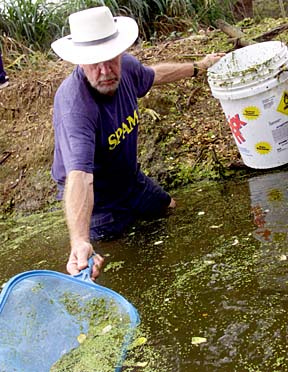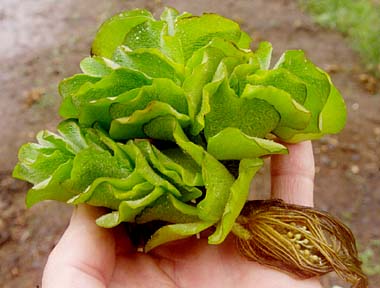
KEN IGE / KIGE@STARBULLETIN.COM
Stan Uyehara of Pets Plus holds up elodea, a plant used in aquariums that shouldn't be thrown into lakes or marshes.
Good plants IN A CASE OF Good intentionS gone awry, compassion, coupled with ignorance, may have started the Salvinia molesta mess at Lake Wilson. Stan Uyehara, of Pets Plus, believes that a person weary of maintaining an aquarium likely resorted to dumping its contents into the lake with a plant remnant left to grow to monstrous proportion. It wasn't the plants they were trying to save.
gone bad
Dumping aquarium fish
and plants may seem harmless
but result in state-size problemBy Ruby Mata-Viti
ruby@starbulletin.com"Most don't feel sorry for water plants," said the manager of the Ward Avenue store. "Someone probably felt sorry for the fish."
Pets Plus is one of many pet shops that accepted unwanted fish during a 1990s media campaign encouraging pet owners to donate aquarium pets to the stores rather than dump them into streams.
Another theory behind the environmental disaster is the possibility that a nearby, unshielded garden pond flooded in rains, transporting the plant to a place where it could proliferate, said Ethan Hara, of Koolau Farms in Kaneohe, who agreed people probably wouldn't drive miles to discard a water plant. "They would for fish, maybe, that they don't want to flush down the toilet."
Preventing future mishaps is a matter of educating the public, according to Domingo Cravalho of the Department of Agriculture, who said that routine messages in print and broadcast media would go a long way in boosting awareness that small deeds can have large consequences and that it's everyone's duty to be responsible for the environment.
THE 1990s media campaign was spearheaded by a pet industry coalition in conjunction with the Department of Agriculture and Department of Land & Natural Resources, said Cravalho, an aquatic and biota specialist.
FL MORRIS / FMORRIS@STARBULLETIN.COM
Volunteers, including Ted Rogers shown here, cleaned Kawainui Marsh last month, removing salvinia and other noxious weeds. Rogers scoops noxious vegetation from a marsh ditch alongside Kapaa Quarry Road.
In addition to combating Salvinia molesta, Cravalho, who works in the plant quarantine division, said other potential plant menaces are elodea and water lettuce.
These are considered weeds that grow out of hand and choke other wildlife when found out of their element. "These organisms are intended to be used in a semiclosed system, like pond gardens or aquariums," he said.
The plants do not thrive in water with high salinity or in swift-moving currents such as streams, but are at home in still water, which is why the problem occurs in places like Kawainui Marsh, Lake Wilson and the Hoomaluhia basin, he said.
When his water garden sprung a leak, its decorative water lettuce was limp after 24 hours. Taro and Amazon swords anchored in clay soil survived.
"Water lettuce is a floating plant; it dies in a day out of water, and I just dumped it onto my compost pile and used it as mulch."
AS WITH ANY campaign, it takes money to get the word out, and "more funding would need to be made available for something like (the '90s fish) one," Cravalho said.
KEN IGE / KIGE@STARBULLETIN.COM
Salvinia molesta
Sometimes radio and TV stations take it upon themselves to create public service announcements which are inserted into news broadcasts as part of the commercial breaks, he added.
"Just a quick 15-second clip provides a powerful message," he said, and can be used to remind people that any aquatic plant can become the next water molester, "so don't throw it into the water willy-nilly. Be responsible stewards of the environment. Give it to someone else who wants to maintain it, or take it to a garden shop."
A good example, said Cravalho, is a New Zealand campaign that "hammers the public, saying 'Keep New Zealand New Zealand,' to protect their fronts from invasive species."
Cravalho said the state doesn't have enough funds to tackle issues in every agency, but it does what it can, such as sending speakers to neighborhood board meetings, Lions and sorority clubs, and talking to school groups when invited.
For conscientious citizens who don't need reminders, Uyehara said Pets Plus continues to accept pets as donations, and they'll even take aquarium plants.
Click for online
calendars and events.



